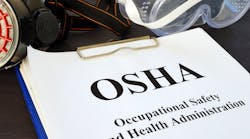As officials across the United States give the green light to retail, restaurant and other businesses to reopen their doors, OSHA has announced it will bolster its in-person inspections.
OSHA stated that the newly-issued enforcement guidance to increase inspections "reflects changing circumstances in which many non-critical businesses have begun to reopen in areas of lower community spread." Staff has been directed to prioritize COVID-19 inspections as well as utilize all enforcement tools "as OSHA has historically done."
The revised policies come as criticism regarding its alleged lack of enforcement and a class-action lawsuit against the agency makes headlines.
The agency back-peddled from its previous enforcement memos that stated it would consider "good-faith" efforts of employers before issuing citations. In a notice dated April 10, OSHA stated that it would "exercise enforcement discretion" because of the difficulty of proving how or where a worker contracted the SARS-CoV-2 virus.
To date, OSHA has not issued any citations for COVID-19-related inspections. A May 18 article examined OSHA's inspection records. Politico Journalist Rebecca Rainey discovered the agency initiated inspections into only 7% of COVID-19 related complaints.
On May 18, the American Federation of Labor and Congress of Industrial Organizations (AFL-CIO) filed a petition in the U.S. Court of Appeals that would force OSHA to enact an emergency temporary standard to protect American workers. The largest federation of labor unions has been urging the agency to adopt a general infectious disease standard since 2009.
“It’s truly a sad day in America when working people must sue the organization tasked with protecting our health and safety,” announced AFL-CIO President Richard Trumka. “But we’ve been left no choice. Millions are infected and nearly 90,000 have died, so it’s beyond urgent that action is taken to protect workers who risk our lives daily to respond to this public health emergency. If the Trump administration refuses to act, we must compel them to.”
EHS Today has contacted OSHA regarding the lawsuit. The agency has not yet provided a response.
U.S. Secretary of Labor Eugene Scalia previously defended the agency's actions to protect workers during the pandemic, saying, "the coronavirus presents grave and shifting challenges that require sustained attention; we evaluate daily what additional steps we can and should take."
In addition to increasing COVID-19-related in-person inspections at all workplaces, OSHA also has revised its recordkeeping policies.
The agency previously suspended requirements related to COVID-19 for employers outside of the healthcare industry unless there was "objective evidence" that the case was work-related and the evidence was "reasonably available" to the employer.
Under the new recordkeeping procedure, employers are responsible for recording cases of SARS-CoV-2 if the test returned to the worker is positive; if the case is work-related as defined by its 29 CFR 1904.5 standard; and if it involves one or more of the general recording criteria in 29 CFR 1904.7, such as medical treatment beyond first aid or days away from work.
Following the listed requirements for recordkeeping, OSHA added, "given the nature of the disease and community spread, however, in many instances it remains difficult to determine whether a coronavirus illness is work-related, especially when an employee has experienced potential exposure both in and out of the workplace."
The agency reminded employers that they must make "reasonable efforts based on evidence" to determine whether the worker contracted the illness on the job. Even though the employer records a positive coronavirus case, it does not necessarily mean they violated any existing OSHA standards, according to the agency.
Companies that employ fewer than ten workers, as well as "certain" employers in low-hazard industries, do not fall under these new recordkeeping obligations. The requirement becomes mandatory if the work-related coronavirus illness results in a fatality, in-patient hospitalization, amputation or loss of an eye.

